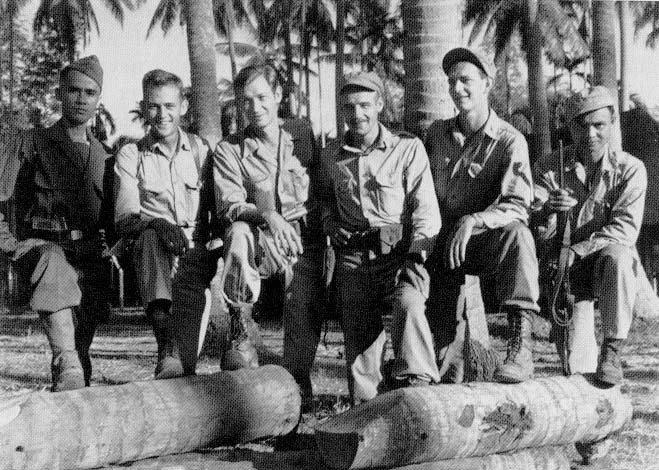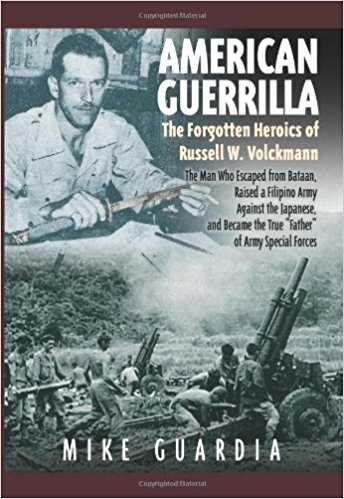Unless you’re a Special Operations soldier or avid reading buff of guerrilla warfare, chances are that you’ve never heard much of Russell W. Volckmann. But American Guerrilla, The Forgotten Heroics of Russell W. Volckmann should be required reading for prospective Special Operations troops as well as current operators (although I dislike that term). The book was written by a former Armor officer Mike Guardia who tells the life story and military career of a very important if somewhat ignored American military officer.
Guardia weaves a very entertaining read of a staff officer stationed in the Philippines just prior to World War II who didn’t retreat to Australia with General Douglas MacArthur nor surrender after the capitulation of U.S. troops on Bataan. Instead, Volckmann and his troops retreated into the jungle. There he raised at first a rag-tag army of American and Filipinos that turned into a powerful guerrilla army of US and Filipinos that reached a strength of 22,000. His hit and run raids and ambushes against the Japanese occupation forces killed 50,000 of the enemy. They tied up huge amounts of Japanese troops and kept the enemy harassed until the invasion by the Americans helped liberate the islands from the empire of Japan.
In the jungles, Volckmann’s troops made contact with Allied headquarters in Australia and helped direct Allied efforts to key enemy positions. He set up a resupply chain via American submarines for the resistance and helped direct the Allies when they returned to the Philippines. The guerrillas saved countless lives by giving MacArthur’s staff timely and accurate intelligence on the enemy. And when the Japanese began to discuss surrender terms with the Allies, Japanese General Yamashita sought out Volckmann rather than MacArthur to open negotiations.
Yet when most military historians discuss the campaign of the Philippines, Volckmann’s name is rarely mentioned while discussing MacArthur’s campaign to recapture the former American protectorate.
In the book’s final two chapters Guardia makes the case for the naming of Volckmann and not Aaron Bank as the “true” father of the US Army Special Forces. That was sure to raise some hackles in the SF community where Bank is always discussed in the highest regard possible. We’ll address that below as he makes a compelling argument.
At only 240 pages, the book is quickly and easily digested although Guardia could have delved more into the other resistance movement across the Philippines focusing on Volckmann’s sizable contribution. He also was very critical of MacArthur’s decision to withdraw to Australia, (following the orders of the President) which has always been a source of controversy. The details about Volckmann’s operations seemed a bit thin, the author could’ve used a bit more detail there. One surprising aspect of the interviews done for the book was that no former Filipino guerrillas were quoted here. The lack of better maps of the areas that the guerrillas operated in was a detriment to the book and later additions should see to that. It would make it much easier for the reader to follow along and travel
Volckmann kept a diary where he daily logged on his attempts to raise, train and lead a guerrilla force of Filipinos from Luzon. They were a thorn in the Japanese’s side, committing acts of sabotage, raids, ambushes as well as intelligence gathering that was extremely valuable to the Americans once they began their attempts to recapture the Philippine Islands.
Students of Guerrilla and Unconventional Warfare should study the struggles of Volckmann’s efforts against the Japanese that stretched on for three years. And his efforts definitely saved countless lives, yet in all the books about MacArthur’s triumphant return, he’s scarcely mentioned if at all which is a tragic oversight.
Guardia’s assertion that Volckmann, not Bank is the true father of the modern day Special Forces is based on his role in drafting the Army’s counterinsurgency doctrine and the concepts for Guerrilla Warfare and Special Forces operations. He was tasked with the writing of the two Army field manuals, Operations Against Guerrilla Forces and Organization and Conduct of Guerrilla Forces for the Psychological Operations Command.
While Volckmann had a tremendous influence on the development of Special Forces, one must remember that many of the operational tenets that he wrote in the two manuals, while tried and tested under his leadership in the Philippines were already being used by the O.S.S. in their own training and operations. That in no way should denigrate from Volckmann’s tremendous efforts, as he deserves a place at the table for Special Forces founders.
Did Guardia prove his statement that Volckmann “designed the mission capabilities and operational framework” of the Special Forces? No. I am still firmly in the camp that Bank, drawing on his own experiences as a “Jedburgh” created the organizational makeup of SF that exists to this day. And the fact that it was he, Bank selected as the 10th Special Forces Group’s first commander that deserves that honor.
However, despite that, I recommend students of Special Warfare read “American Guerilla” simply from the standpoints that it is a good look at the American and Filipino guerrilla warfare efforts against the Japanese and that sometimes it is a good thing to read and discuss viewpoints different from your own…. There is entirely too little of that today.
Photos Courtesy: US Army, Amazon.com











COMMENTS